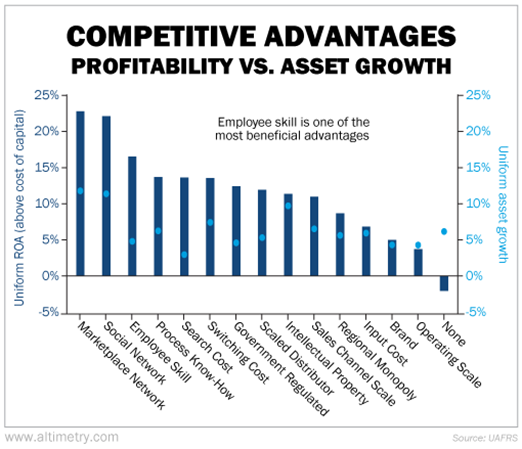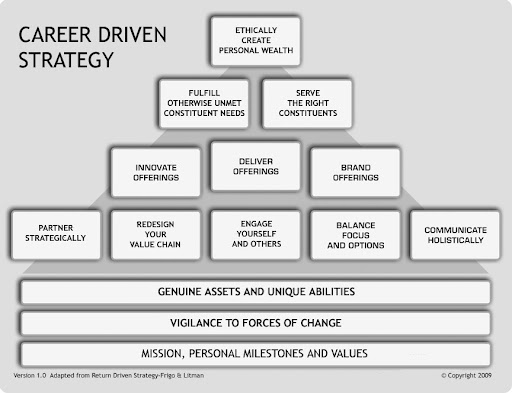Here’s why businesses are hiring ex consultants to the C-suite!
| From the desk of Miles Everson: Hello! I’m thrilled to share another valuable insight for today’s “The Independent Investor.” Every Wednesday, I talk about investing in the hopes of helping you attain financial independence through this activity. Today, I want to take a deep dive on employee skill and why it plays a crucial role in company performance. Curious? Keep reading below to know more! |
Here’s why businesses are hiring ex consultants to the C-suite! Throughout the 20th century, America’s top executives usually came from General Electric , IBM , and Procter & Gamble . Alumni from these conglomerates fanned out across corporate America and brought with them a rigorous and operations-first playbook Fast forward to now, those days are firmly behind us, as a new crop of corporations now dominates the list of previous employers for newly appointed CEOs. Consulting firms like McKinsey and Accenture now provide the bulk of C-suite employees, doing so from 2020 to 2024. This is the first time consultants have claimed top leadership spots since researchers began tracking this data. Prior to this, manufacturers or tech firms served as previous employers of would-be top executives. With this in mind, it’s a clear sign that what’s required of executive leaders are changing on a fundamental level. Problem-solving > Operational Prowess
Back then, those who climbed the corporate ladder were the ones who ran big divisions. However, today’s CEOs are being chosen for their ability to solve problems rather than operational skills. While the latter still matters, it’s no longer top priority. This is because the modern C-suite needs integrators who can navigate challenges and disruptions, not just career operators. In that kind of corporate environment, consultants just offer a different kind of edge. Accenture is a great example of this. The consulting giant spends more than USD 1 billion a year on workforce development. The company puts its employees through rotational programs where they get to experience working in multiple parts of the business, such as strategy and consulting, ending up with them getting exposure to clients in multiple sectors. As a result, Accenture’s alumni often leave with a tool kit made specifically for executive leadership. Other consultants like McKinsey, Bain , and Boston Consulting Group offer similar preparation as their people are trained to introduce creative thinking to help large organizations improve, making them well-equipped to lead companies towards growth and unpredictable environments. Employee Skill is A Competitive Advantage According to Professor Joel Litman , CEO of Valens Research and Chief Investment Officer of Altimetry Financial Research , there are 14 types of competitive advantage. Some firms get ahead by being large enough to produce cheaper goods than their peers. Meanwhile, others rely on brand equity. Consulting firms in particular build their advantage by hiring and training experts in specific areas and selling their time to customers as it’s often cheaper for clients to contract consultants for specific projects rather than hire directly. However, this isn’t the case at the C-suite level, as companies will hire ex-consultants to help grow their own employee skill advantage. The chart below shows competitive advantage from over 3,000 publicly traded U.S. companies.
The blue bars show how much of a profit boost each advantage grants above the baseline 5% cost of capital while the light blue dots show the average Uniform asset growth for companies with each advantage. As can be seen above, companies with the employee skill advantage come in third place for profitability. The only advantages that rank higher are “network” businesses. eBay is an example of a buying and selling network while Meta is an example of a social network. While not every firm can be a network or operate like one, it cannot be denied that all businesses can benefit from employee skill. This is exactly why companies nowadays are prioritizing CEOs who can sharpen employee skills across all levels of an organization. Simply said, employee skill provides a competitive advantage that can propel companies to unlock higher levels of performance. — Most investors often look to intangible assets like brand and intellectual property as they’re easy to understand and offer a competitive moat, even if it’s only for a short time. However, organizational knowhow and employee skill just may be some of the most overlooked drivers of long-term performance of growth. Companies that invest in their people tend to perform better than just about every other kind of business. That’s why businesses across all kinds of industries are hiring at least one former consultant as they’re the ultimate employee skill experts. Employee skill may not be the most attention-grabbing metric, but it can surely lead to steady improvement in performance. That’s why as an investor, it’s important to keep this in mind when looking for opportunities in the market. EXCITING NEWS AHEAD The world of work has shifted, and there’s no going back. The barriers to entry have never been lower for talented professionals to work independently, and today’s massive external workforce is hardly a pandemic-produced fad. Business owners can only survive in the new work landscape by partnering with this deep talent pool. With decades of experience in both small-business entrepreneurship and executive management at PwC, I truly believe that the future of work is independent. With that, I’m happy to share with you that my book, co-authored with Walter Scott Lamb, is now available on Amazon! Free Birds Revolution: The Future of Work & The Independent Mind This new bestseller is an essential read for both independent professionals and corporate executives. Here, we provide educational and practical guides to unpack the ever-growing workforce and offer you crucial ways to become a client of choice. Click on the link above to order your copy. Let this bestselling book help you future-proof your career and organization in the new world of work. Stay tuned for next Wednesday’s The Independent Investor! There’s a saying in the investment world: “If something seems too steady to be real, it probably isn’t.” Learn more about why smart investors are pumping the brakes on China in next week’s article! |

Miles Everson
CEO of MBO Partners and former Global Advisory and Consulting CEO at PwC, Everson has worked with many of the world's largest and most prominent organizations, specializing in executive management. He helps companies balance growth, reduce risk, maximize return, and excel in strategic business priorities.
He is a sought-after public speaker and contributor and has been a case study for success from Harvard Business School.
Everson is a Certified Public Accountant, a member of the American Institute of Certified Public Accountants and Minnesota Society of Certified Public Accountants. He graduated from St. Cloud State University with a B.S. in Accounting.




